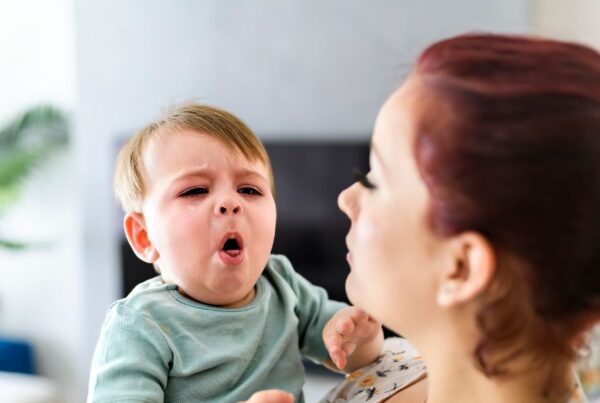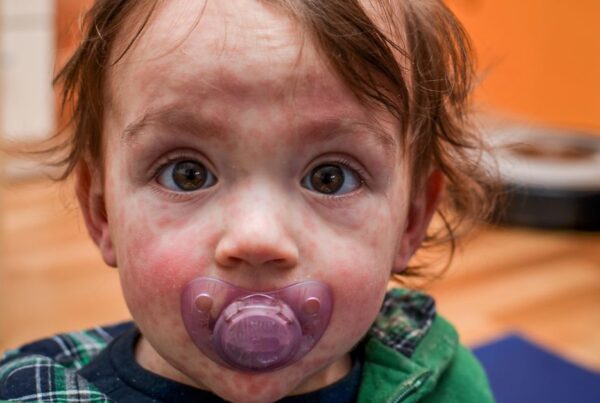There are many natural parasite cleanses available on the market and lately parents in my community have been wondering, Should I give my child a parasite cleanse? Please note, I do not recommend parasite cleanses for infants, toddlers, and children without the assistance of a healthcare provider and diagnostic testing.
This article gives a brief overview of the types of parasites that infect humans, symptoms of intestinal parasites, surprising benefits of some parasites, difference between a parasite cleanse and parasite treatment, and components of a parasite cleanse. I also include a link to download the parasite cleanse instructions that I give to my patients.
What Is A Parasite?
Parasites are small organisms that live in or on us —the “hosts”— and use our resources to live. There are three main classes of human parasite:
- Protozoa: Protozoa are tiny single-celled organisms that can’t be seen by the human eye. The best known infectious protozoa is Giardia, which is the most common parasitic infection in the world and the second most common parasitic infection in the United States (1). Amoebas, which cause infectious amoebiasis, are also protozoans.
- Helminthes: There are many different types of parasitic worms that affect humans, including tapeworms, hookworms, pinworms, and flukes. Pinworms are the most common parasitic infection in the United States (1).
- Ectoparasites: These organisms live outside the host and include things like ticks, mites, fleas, and lice.
When people in the natural health community speak about doing a parasite cleanse, they are usually referring to a protocol that targets parasites that live in the intestines, such as protozoa and worms.
What Symptoms Are Caused By Intestinal Parasites?
There are a number of different intestinal parasites that affect humans, and their effects range from potentially beneficial to very harmful. Each different organism causes a unique set of symptoms, but there is some overlap between them. In this article, we take a look at general symptoms. If you’re interested in learning more, the references listed at the bottom of this article can be further explored.
Beneficial Effects Of Intestinal Parasites
Humans evolved alongside all the members of the microbial world, including viruses, bacteria, yeast, fungi, protozoa, and worms. Though we are most concerned with these organisms when they cause disease, a growing body of research shows that many of them can be helpful to human health when they coexist in a state of balance (2).
The growing awareness of “good bacteria” is a prime example. Even though we know that unhealthy bacteria may cause severe illness, good bacteria seem to protect and enhance good health. It is possible that future research will discover that there are “good intestinal parasites” as well (2).
Present research shows that certain intestinal parasites can be helpful in immune regulation. The following benefits have been noted:
- Reduced allergic tendencies (3,4)
- Reduced autoimmune tendencies (4)
- Modulated immune response (5)
- Improved inflammatory balance (6)
Some scientists interested in the hygiene hypothesis* have wondered whether our reduced colonization and interaction with parasites has played a role in the modern increase in immune problems (7).
At present, we don’t know how some people receive positive effects from parasitic colonization while others get negative effects. However, scientists are actively looking into how to use some of these organisms therapeutically to improve immune balance (8).
To be clear: I do NOT recommend pursuing an intestinal parasite in order to balance your immune system! This information is still controversial and very much in the theory and exploration stage. The reason I’m sharing this with you is that, in natural health circles, there is sometimes fear-mongering of parasites living unknown in your intestines for years and this thought has caused some people a lot of distress. I want to present the possibility that certain asymptomatic parasites may be a normal and even helpful part of the human gut ecosystem (8).
If you want to learn more, I recommend this 2022 review paper: How the gut parasitome affects human health – PMC
* The hygiene hypothesis is the theory that in pursuing more stringent hygiene, some societies, including ours, have inadvertently harmed immune balance, thereby increasing allergic and autoimmune tendencies (9).
Nonspecific Negative Effects Of Intestinal Parasitic Colonization
Sometimes intestinal parasites are asymptomatic and people don’t even know that they have them. They may be working behind the scenes to help balance the immune system as described above, but alternatively, they may be causing inflammation, dysbiosis, and immune-mediated problems!
Nonspecific* negative effects of parasitic colonization may include:
- Fatigue
- Irritability — especially if it seems to vary with moon cycles
- Persistent digestive symptoms — especially bloating, nausea, diarrhea
- Persistent intestinal dysbiosis**
These so-called asymptomatic colonizations have also been associated with the development of celiac disease, inflammatory bowel disease, inflammatory bowel syndrome, and multiple sclerosis (8,10).
This is the stage at which a parasite cleanse, such as the one covered below, may be most helpful. However, if you suspect parasites may be at the root of your health concerns, checking in with a doctor first is absolutely essential. If you have a detectable parasitic infection, you will need medical diagnosis and treatment instead of a parasite cleanse.
* When used to describe medical symptoms, nonspecific means that symptoms aren’t specific to a certain disease and could be caused by a number of factors.
** Dysbiosis is an unhealthy imbalance in the microbiome vs. an infection, which is a more serious invasion and overgrowth of pathogenic organisms. Dysbiosis can lead to infection and vice versa.
Symptoms Of Intestinal Parasite Infections
Pathogenic intestinal parasites cause a wide range of symptoms, but it is important to remember that these symptoms may have a wide range of root causes and that parasites are just one option among many. Some clues that it is time to check in with a doctor about a potential parasite infection include:
- Unintended weight loss (always a medical red flag to see a doctor)
- Fatigue
- Anemia and malnutrition
- Digestive symptoms (abdominal pain, diarrhea, nausea, vomiting)
- Diarrhea with blood and mucus
- Rash and/or itching around anus and/or vulva
- Passing of a worm in stool
If your doctor is concerned that you have a parasitic infection, they may perform stool and blood tests. Sometimes imaging may be required. Treatment varies depending on the type of intestinal parasite that you have.
Parasite Cleanses VS. Parasite Treatments
It is important not to confuse parasite cleanses with parasite treatments.
Parasite cleanses tend to be gentle safe therapies that cause minimal side effects and promote an overall healthy microbiome. The foods and herbs used in such cleanses may have mild anti-parasitic effects that can potentially discourage parasite overgrowth but generally aren’t strong enough to treat parasite infections or completely eliminate parasites.
Parasite treatments require strong anti-parasitic herbs or pharmaceutical medications over a prescribed period of time. These treatments may have significant side effects, and monitoring by a health professional is required to ensure safety and efficacy. In my experience, pharmaceutical medications tend to be easier on the body and more effective for treating parasites. Natural medicine is helpful in rebuilding gut health and microbiome diversity after pharmaceutical treatment.
To learn more about healing the gut, see:
- A Nutritional Approach To Restore Gut Health After Food Poisoning Or Stomach Virus
- How To Heal The Gut
- Homemade Marshmallows With Marshmallow Root: A Recipe for A Healthy Gut!
NOTE: It is important not to use parasite cleanses to treat actual parasitic infections because these infections require medical attention. It is important not to use strong anti-parasitic treatments as a parasite cleanse because these treatments are much too harsh and aren’t appropriate for at home health promotion.
When To Consider A Parasite Cleanse
When done correctly, parasite cleanses can be a good way to maintain a healthy intestinal environment.
In my practice, I may recommend a parasite cleanse in the following instances:
- When family and/or household members are being treated for parasites
- During or after international travel to boost intestinal health
- After a strong pharmaceutical antibiotic/antifungal/antiparasitic treatment to promote regrowth of healthy microbiome while discouraging unwanted microbes
- When lingering minor gastrointestinal symptoms aren’t responding as expected to treatment
- When people have had parasites in the past or have a high exposure risk to keep the gut healthy (once or twice a year)
Components Of A Good Parasite Cleanse
A good parasite cleanse consists of several components: gentle anti-parasitics, intestinal toxin binder (optional), probiotics, and a healthy diet.
Anti-Parasitic Plant Foods & Herbs
The anti-parasitic plant medicines that I prefer to use in a parasite cleanse are actually foods: pumpkin seeds (11), ginger (12), turmeric (13), and garlic (14). In addition to these functional foods, I will often add black cumin seed (15) for a more potent effect. Each of these target parasites in a different way, so when combined you get a nice broad effect. Plus, these are gentle on the intestinal microbiome, so side effects are usually minimal.
Higher amounts of pumpkin seeds, ginger, turmeric, and garlic can be consumed during a cleanse for a more powerful therapeutic effect. However, including them in your usual diet is a great way to keep your gut and intestinal microbiome healthy.
Intestinal Toxin Binders
Intestinal toxin binders are used to help bind toxins in the gut and carry them out of the body through feces. This is an optional addition to a parasite cleanse, especially if the diet already contains a good amount of fiber, which also acts as a binder.
Due to the theory that parasites release toxins when they die, which can temporarily make people feel unwell, intestinal toxin binders are used to remove any potential toxins.
There are many toxin-binders to choose from. For binders to use alongside a parasite cleanse, I look for something that is accessible, inexpensive, and easy on digestion. Options include activated charcoal, zeolite, diatomaceous earth, ground flax seeds, chia seeds, modified citrus pectin, and others.
Probiotics
Probiotics are helpful during a parasite cleanse because they have a positive impact on the immune system and are helpful for gut health; certain strains may even directly target parasites. Though there is early research that shows that probiotic supplementation can help with certain parasites, it is not yet an approved stand-alone treatment for parasitic infection (16-19).
Healthy Foods
During a parasite cleanse, it is important to focus on healthy whole foods that nourish you while avoiding foods that parasites love to eat. This means focusing on healthy whole foods while reducing processed foods and sugar. Staying hydrated and consuming plenty of fiber is essential.
Read more about healthy eating: The Basics Of Anti-Inflammatory Eating For The Whole Family
Does Everyone Need A Parasite Cleanse?
A question that I’ve been asked more times than I can count in the decade plus since I started practicing integrative medicine is, Does everyone need a parasite cleanse?
In my opinion, most people do not require parasite cleanses, but it can make a big difference in digestive health, energy, and mood for the people who do.
When considering whether or not you or your family needs a parasite cleanse, you may wish to consult the “When To Consider A Parasite Cleanse” section above. I do not recommend parasite cleanses for infants, toddlers, and children without the assistance of a healthcare provider and diagnostic testing.
Download my parasite cleanse instructions here!
When To See A Doctor About Suspected Parasites
If you suspect that you have a parasitic infection, it is important to see a doctor rather than trying to treat it on your own with natural antiparasitics or parasite cleanses.
Signs it is time to see a doctor include:
- Unintended weight loss
- Unusual fatigue or tiredness
- Digestive symptoms that last more than a week (abdominal pain, diarrhea, nausea, vomiting)
- Diarrhea with blood and/or mucus
- Rash and/or itching around anus and/or vulva
- Visible worms in stools
Summary
Parasites are a perennial hot topic in the natural health community. They coexist with humans along a spectrum, from part of the normal microflora to causing subclinical issues or even a full-blown parasitic infection (8).
In my professional opinion, parasitic infection and treatment needs to be diagnosed and monitored by a healthcare professional because parasites can be stubborn to eradicate and can cause severe health problems if untreated or improperly treated, and because both natural and conventional antiparasitic treatments can be hard on the body.
In contrast, parasite cleanses for health promotion may be helpful in certain instances, as described in this article.
References:
- Kucik, C. J., Martin, G. L., & Sortor, B. V. (2004). Common intestinal parasites. American family physician, 69(5), 1161–1168.
- Stiemsma LT, Reynolds LA, Turvey SE, Finlay BB. The hygiene hypothesis: current perspectives and future therapies. Immunotargets Ther. 2015 Jul 27;4:143-57. doi: 10.2147/ITT.S61528. PMID: 27471720; PMCID: PMC4918254.
- Feary J, Britton J, Leonardi-Bee J. Atopy and current intestinal parasite infection: a systematic review and meta-analysis. Allergy. 2011 Apr;66(4):569-78. doi: 10.1111/j.1398-9995.2010.02512.x. Epub 2010 Nov 18. PMID: 21087217.
- Maizels RM. Regulation of immunity and allergy by helminth parasites. Allergy. 2020 Mar;75(3):524-534. doi: 10.1111/all.13944. Epub 2019 Jul 18. PMID: 31187881.
- Chen H, Cao Z, Liu M, Diamond MS, Jin X. The impact of helminth-induced immunity on infection with bacteria or viruses. Vet Res. 2023 Oct 3;54(1):87. doi: 10.1186/s13567-023-01216-3. PMID: 37789420; PMCID: PMC10548622.
- Jirků M, Lhotská Z, Frgelecová L, Kadlecová O, Petrželková KJ, Morien E, Jirků-Pomajbíková K. Helminth Interactions with Bacteria in the Host Gut Are Essential for Its Immunomodulatory Effect. Microorganisms. 2021 Jan 22;9(2):226. doi: 10.3390/microorganisms9020226. PMID: 33499240; PMCID: PMC7910914.
- Rook GA. Regulation of the immune system by biodiversity from the natural environment: an ecosystem service essential to health. Proc Natl Acad Sci U S A. 2013 Nov 12;110(46):18360-7. doi: 10.1073/pnas.1313731110. Epub 2013 Oct 23. PMID: 24154724; PMCID: PMC3831972.
- Ianiro G, Iorio A, Porcari S, Masucci L, Sanguinetti M, Perno CF, Gasbarrini A, Putignani L, Cammarota G. How the gut parasitome affects human health. Therap Adv Gastroenterol. 2022 Apr 30;15:17562848221091524. doi: 10.1177/17562848221091524. PMID: 35509426; PMCID: PMC9058362.
- Stiemsma LT, Reynolds LA, Turvey SE, Finlay BB. The hygiene hypothesis: current perspectives and future therapies. Immunotargets Ther. 2015 Jul 27;4:143-57. doi: 10.2147/ITT.S61528. PMID: 27471720; PMCID: PMC4918254.
- Mohammadi R, Hosseini-Safa A, Ehsani Ardakani MJ, Rostami-Nejad M. The relationship between intestinal parasites and some immune-mediated intestinal conditions. Gastroenterol Hepatol Bed Bench. 2015 Spring;8(2):123-31. PMID: 25926937; PMCID: PMC4403024.
- Grzybek M, Kukula-Koch W, Strachecka A, Jaworska A, Phiri AM, Paleolog J, Tomczuk K. Evaluation of Anthelmintic Activity and Composition of Pumpkin (Cucurbita pepo L.) Seed Extracts-In Vitro and in Vivo Studies. Int J Mol Sci. 2016 Sep 1;17(9):1456. doi: 10.3390/ijms17091456. PMID: 27598135; PMCID: PMC5037735.
- Ranasinghe S, Armson A, Lymbery AJ, Zahedi A, Ash A. Medicinal plants as a source of antiparasitics: an overview of experimental studies. Pathog Glob Health. 2023 Sep;117(6):535-553. doi: 10.1080/20477724.2023.2179454. Epub 2023 Feb 20. PMID: 36805662; PMCID: PMC10392325.
- Moghadamtousi SZ, Kadir HA, Hassandarvish P, Tajik H, Abubakar S, Zandi K. A review on antibacterial, antiviral, and antifungal activity of curcumin. Biomed Res Int. 2014;2014:186864. doi: 10.1155/2014/186864. Epub 2014 Apr 29. PMID: 24877064; PMCID: PMC4022204.
- Goncagul G, Ayaz E. Antimicrobial effect of garlic (Allium sativum). Recent Pat Antiinfect Drug Discov. 2010 Jan;5(1):91-3. doi: 10.2174/157489110790112536. PMID: 19929845.
- Forouzanfar F, Bazzaz BS, Hosseinzadeh H. Black cumin (Nigella sativa) and its constituent (thymoquinone): a review on antimicrobial effects. Iran J Basic Med Sci. 2014 Dec;17(12):929-38. PMID: 25859296; PMCID: PMC4387228.
- Dinleyici EC, Eren M, Dogan N, Reyhanioglu S, Yargic ZA, Vandenplas Y. Clinical efficacy of Saccharomyces boulardii or metronidazole in symptomatic children with Blastocystis hominis infection. Parasitol Res. 2011 Mar;108(3):541-5. doi: 10.1007/s00436-010-2095-4. Epub 2010 Oct 5. PMID: 20922415.
- Dashti N, Zarebavani M. Probiotics in the management of Giardia duodenalis: an update on potential mechanisms and outcomes. Naunyn Schmiedebergs Arch Pharmacol. 2021 Sep;394(9):1869-1878. doi: 10.1007/s00210-021-02124-z. Epub 2021 Jul 29. PMID: 34324017.
- Ribeiro MRS, Oliveira DR, Caliari MV, Cara Machado DC, Andrade MER, Cardoso VN, Dos Santos Martins F, Nicoli JR, Gomes MA. Saccharomyces boulardii as therapeutic alternative in experimental giardiasis. J Appl Microbiol. 2021 Jul;131(1):460-469. doi: 10.1111/jam.14941. Epub 2020 Dec 9. PMID: 33289232.
- Saracino MP, Vila CC, Baldi PC, González Maglio DH. Searching for the one(s): Using Probiotics as Anthelmintic Treatments. Front Pharmacol. 2021 Aug 9;12:714198. doi: 10.3389/fphar.2021.714198. PMID: 34434110; PMCID: PMC8381770.



3 Comments